九年级英语第14单元第6课时教案
新目标九年级英语全册同步教学设计:Unit 14 I rememb
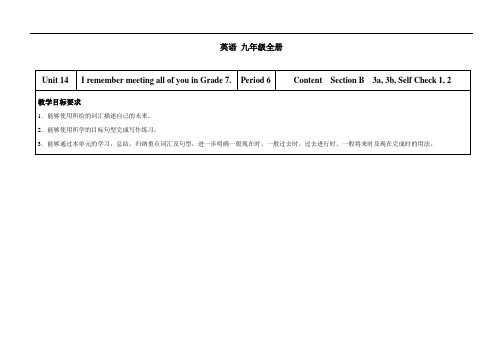
英语九年级全册Unit 14 I remember meeting all of you in Grade 7. Period 6 Content Section B 3a, 3b, Self Check 1, 2 教学目标要求1.能够使用所给的词汇描述自己的未来。
2.能够使用所学的目标句型完成写作练习。
3.能够通过本单元的学习,总结、归纳重点词汇及句型,进一步明确一般现在时、一般过去时、过去进行时、一般将来时及现在完成时的用法。
教学过程活动步骤教与学活动目的及其操作教学资源运用复习时间5 m 1复习已学目标语和导入话题。
Ask students to retell the speech they learned last class. 2仿照上述内容组织group work复习活动。
OK, Let’s work in groups.学生小组活动,教师抽查几组学生。
3a时间10 m 3引入本节课课题。
教师板书或课件显示:Unit 14 I remember meeting all of you in Grade 7. Period 6.教师引导学生默读并思考3a中的问题。
结合自己的实际情况简单做注释并回答问题。
然后可以采取生生互问的方式逐一回答问题或师生互动的方式逐一回答问题。
4 教师要求学生按问题顺序口头组织一篇文章并简单写下来然后与大家口头分享。
(不同的学生有不同的答案)5 学生在每一个问题的帮助下,试着用自己的语言进行描述。
3b 时间9 m 6本活动的检查评价。
教师通过学生自己的讲述,引导学生完成3b任务。
Then check the answers.7组织小组互相批改。
Self Check时间12 m 8复习巩固:学生按不同感觉词汇回顾初中生活记忆和体验,学生按活动要求完成练习活动,然后与邻座学生互相分享答案。
(教师可视情况进行展示)9复习目标语言。
学生快速阅读短文,了解大意后思考动词时态。
九年级英语全册Unit14IremembermeetingallofyouinGrade7(第6课
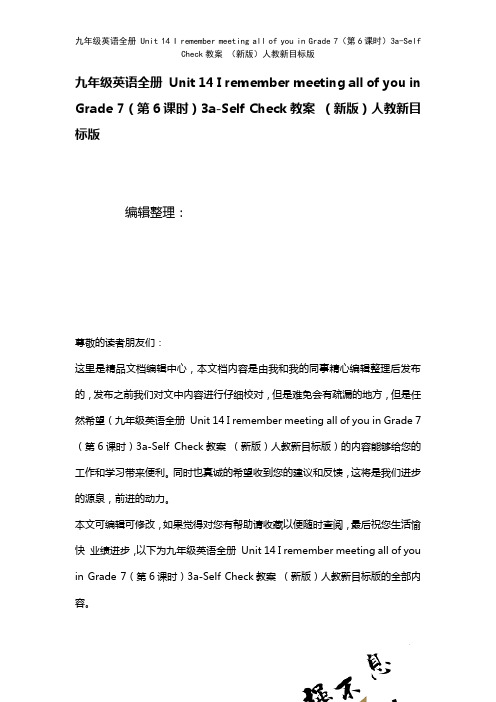
九年级英语全册Unit 14 I remember meeting all of you in Grade 7(第6课时)3a-Self Check教案(新版)人教新目标版编辑整理:尊敬的读者朋友们:这里是精品文档编辑中心,本文档内容是由我和我的同事精心编辑整理后发布的,发布之前我们对文中内容进行仔细校对,但是难免会有疏漏的地方,但是任然希望(九年级英语全册Unit 14 I remember meeting all of you in Grade 7(第6课时)3a-Self Check教案(新版)人教新目标版)的内容能够给您的工作和学习带来便利。
同时也真诚的希望收到您的建议和反馈,这将是我们进步的源泉,前进的动力。
本文可编辑可修改,如果觉得对您有帮助请收藏以便随时查阅,最后祝您生活愉快业绩进步,以下为九年级英语全册Unit 14 I remember meeting all of you in Grade 7(第6课时)3a-Self Check教案(新版)人教新目标版的全部内容。
Unit 14 I remember meeting all of you in Grade 7类别课时要点重点词组1. The last day of junior high school高中最后一天2。
scared and nervous 恐惧和紧张3 .the last day of junior high schoolI。
知识目标II. 课堂环节§自主学习方案【新词自查】根据首字母提示完成单词。
1. The bird opened its wings and flew into the sky。
2. The parents are very sad to separate from their children。
3。
Could you please get me something to drink? I am too thirsty. 4。
九年级英语全册 Unit 14 Have you parked yet?The Sixth Period教案 人教新目标版

Unit 14 Have you parked yet?The Sixth PeriodⅠ.Teaching Aims and Demands1.Knowledge Objects(1) Fill in the blanks and make sentences using lock, clean out, feed, chat, hear(2) Finish the table according to the conversation.2.Ability ObjectTrain students' writing ability.3.Moral ObjectOpportunity belongs to those who have made full preparation.Ⅱ.Teaching Key Points1.Fill in blanks and make sentences.2.Finish the table.Ⅲ.Teaching Difficult PointMake sentences using lock, clean out, feed, chat, hear.Ⅳ.Teaching Methods1.Teaching by explanation2.Speaking methodⅤ.Teaching Aids1.A projector2.The blackboardⅥ.Teaching ProceduresStep Ⅰ RevisionCheck homework. Ask a few students to read the article in 3a. Then Have a student read his or her own article.Step Ⅱ Part 1This activity focuses on vocabulary introduced in the unit.Look at the words in the box. Get a student to read them. Make sure the students understand the meaning of the words. Then say, Please fill in the blanks with the words. In some cases, students may need to use another form of the word, for example adjusting for tense or subject/verb agreement.Get students to fill in the blanks on their own.Check the answers. Ask five students each to read a sentence, filling in the blanks. The rest of the students check their answers.Show the answers on the screen by a projector.1.Have you fed the dog and cleaned your room?2.Don't forget to lock the door if you are the last person to leave.3.I need to clean out my cupboard. I never use the things in it anymore.4.My friend from America called me yesterday. We chatted for hours.5.Have you heard the new song from Mariah Carey? It's very good.Have students make their own sentences with the words, preferably sentences that are meaningful. Walk around the classroom. Collect a few students' answers with mistakes on the blackboard. Then help students correct the mistakes.Sample answers1.Don't forget to lock the door after you go out.2.You should clean out your bed yourself.3.I have already fed the dog.4.We chatted for a long time when we met last time.5.We listened carefully but could hear nothing.Step Ⅲ Part 2This activity provides reading, writing, listening and speaking practice using the target language.Go through the instructions for this activity with the whole class. Invitea pair of students to read the dialogue aloud. Correct any pronunciation errors to make sure the two students are providing a good model for the rest of the class.Sue: Have you done your chores? We are leaving in an hour.Jerry: I've done some of them.Sue: Have you packed your bag?Jerry: It's in the front hall.Sue: Have you said goodbye to grandma?Jerry: The telephone was busy.Sue: And have you watered the plants yet?Jerry: Oh, no. I haven't. I'll do it now.Sue: Have you cleaned your room?Jerry: Do I need to?Sue: Yes, you do.Jerry: Okay.Sue: What else? Oh yeah. Have you washed the dishes?Jerry: It's your job to wash the dishes.Sue: No, it's your turn.Jerry: Okay. I'll do it.Sue: One more thing. Have you gotten the mail from the mail box?Jerry: Look on the table.Sue: Thanks.Let students read the conversation in pairs again. Ask students to say the first thing that Jerry has done. (He has packed his bag) Then get students to make the list individually. While they are working. walk around the classroom providing help if needed.Review the task. Get a few students to share their answers.AnswersThings he has done1.packed his bag2.gotten the mailThings he hasn't done yet1.said goodbye to Grandma2.watered the plants3.cleaned his room4.washed the dishesNotes1.The telephone was busy. = The line was busy.2.gotten—(American English) It is the past participle of get. In British English, the form is got.Step Ⅳ Just for Fun!This activity provides reading and speaking practice with the target language.Ask two students to read the conversation aloud.A: Please water the plants.b: I've already watered them. Get all the students to read the conversation again. Then let students look at the picture. Ask, What is funny about this cartoon? Help students to explain. The boy gave the plants too much water.Ask some pairs of students to present this conversation to the rest of the class.Step Ⅴ Summary and HomeworkIn this class, we've done much writing practice using the key vocabulary words and the target language presented in this unit. After class, please make sentences using the words in Activity 1 in your exercise books. Then finish off the exercises on pages 58~60 of the workbook.Step Ⅵ Blackboard DesignUnit 14 Have you packed yet?Self checkThe Sixth Period Sample answers to Activity 1:1.Don't forget to lock the door after you go out. 2.You should clean out your bed yourself.3.I have already fed the dog.4.We chatted for a long time when we met last time. 5.We listened carefully but could hear nothing.。
九年级英语unit14教案(12页)备课教案教学设计教学反思导学案

九年级英语unit14教案(12页)备课教案教学设计教学反思导学案九年级英语教学设计课题名称Unit14 I remember meeting all of you in Grade7 Section A 1 (1a-2d) 科目English 年级Nine 班级教学时间执教教师课标要求能听懂并运用本课时的重点词语和目标语言进行交流。
学习者分析与教学环境分析学习者分析教学环境分析教学目标1、知识与技能1 本课时的重点词语、词组和句型;2练习听力;2、过程与方法见教学环节3、情感态度与价值观让学生回忆自己的初中生活教学重难点重点本课时的重点词语和句型。
难点不同时态的用法。
教学资源教材、PPT课件。
教学环节教师活动学生活动教学效果导入新课R e v i s i o n a n d l e a d-i n1t e a c h e r a s k st ud en ts t o r e a d t hew o r d s o f u n i t14.2te ac he r l e t s s tu de nt s s a y t h e i rs o m e th in gs t h e y r e m e m b e r do in g atj u n i o r h i g h s c h o o l.1 students read thewords of unit14.2 students say s ayt h e i r s o m e th in gs t h e yr e m e m be r do in g a t ju ni orh i g h s ch oo l.Learn to use thetarget language.师生互动、探究新知Step1 1aAsk the Ss to read check thethings t he y r em em be r d oi ng a tj u n i o r hi gh s c h o o l an d ad d m or e to t h e l i s t.Step2 1b 2a and 2b listenTeacher and students explainthen asks students to readafter the teacher.then playsthe tape and checks theanswers with the students..Step3 2d1 Let Ss read the text andanswer the questions.1) Which teachers will theymiss?2) What subjects do theteachers teach?3) Why will they miss them?4) What will they do tothank them?2 teacher explains with thestudents ,then ask studentsread after the teacher.the Ss to read checkthe things t h eyr e m e m be r d o i n g at j u n i o r h i g h s c h o o l a nd a ddm o r e to th e l is t .Students andteacher explainthen read after theteacher.then listento the tape andcheck the answerswith the teacher.1 Ss read the textand answer thequestions.2s t u d e n t s explainwith thestudents ,then readafter the teacher.Students can saytheir memories and experiences inEnglish .I m p r o v e S s'li st en i n ga n d r e a d i n g s k i l l s. Practicestudents’ spokenEnglish and reading教学反思九年级英语教学设计课题名称Unit14 I remember meeting all of you in Grade7 Section A 2 (3a-3c) 科目English 年级Nine 班级教学时间执教教师课标要求通过学习能读懂与本课难度相当的英语短文。
【最新】九年级英语全册人教版课件:Unit14第6课时
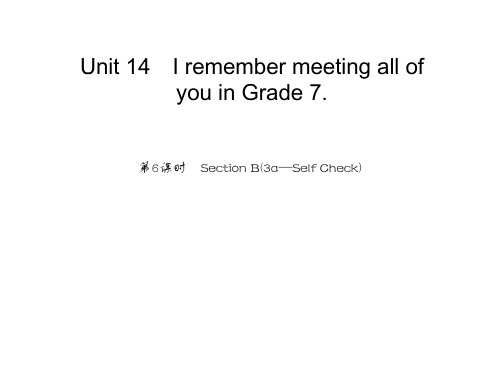
doubled.
初中生活马上就要结束了,三年的初中生活一定给你留 下了很多挥之不去的回忆。请你用英语给大家讲一个最值得 你回忆的故事。包括时间、人物、事情经过和事后你的感想 (请不要写出真实的学校名称以及真实姓名)。词数:态以一般过去时为主。根据题目要求,行文时可考虑采
用下面的模板:
【高分模板】 How time flies! I have studied in my school for three years. And I will graduate from middle school in a few days’ time. I had so many memories in three years’ life. One of them impressed me very much. I still remember, when I began to learn English, I found it too difficult. No matter how hard I tried, I still couldn’t do well in it and almost gave it up. As soon as my English teacher found my problem, she had a talk with me about how to learn English well. Since then, she has kept helping me. Little by little, I’ve become interested in English and I’m good at it. I think I am so lucky to become one of her students. I’ve learned a lot from her.
九年级英语下册unit 14英文教案
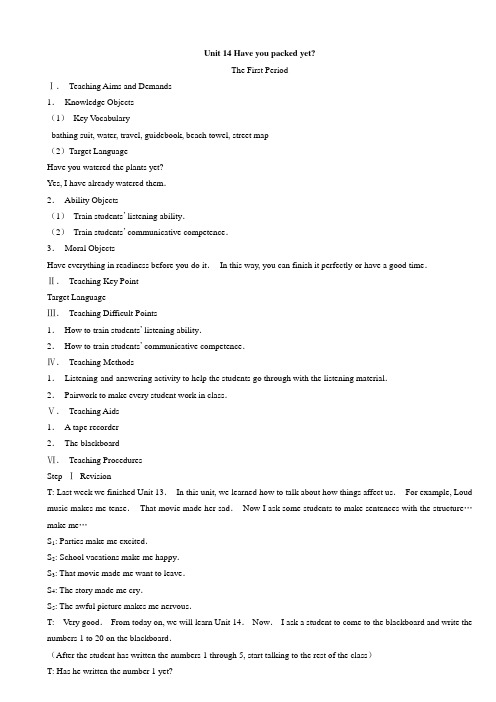
Unit 14 Have you packed yet?The First PeriodⅠ.Teaching Aims and Demands1.Knowledge Objects(1)Key Vocabularybathing suit, water, travel, guidebook, beach towel, street map(2)Target LanguageHave you watered the plants yet?Yes, I have already watered them.2.Ability Objects(1)Train students’ listening ability.(2)Train students’ communicative competence.3.Moral ObjectsHave everything in readiness before you do it.In this way, you can finish it perfectly or have a good time.Ⅱ.Teaching Key PointTarget LanguageⅢ.Teaching Difficult Points1.How to train students’ listening ability.2.How to train students’ communicative competence.Ⅳ.Teaching Methods1.Listening-and-answering activity to help the students go through with the listening material.2.Pairwork to make every student work in class.Ⅴ.Teaching Aids1.A tape recorder2.The blackboardⅥ.Teaching ProceduresStep ⅠRevisionT: Last week we finished Unit 13.In this unit, we learned how to talk about how things affect us.For example, Loud music makes me tense.That movie made her sad.Now I ask some students to make sentences with the structure…make me…S1: Parties make me excited.S2: School vacations make me happy.S3: That movie made me want to leave.S4: The story made me cry.S5: The awful picture makes me nervous.T: Very good.From today on, we will learn Unit 14.Now.I ask a student to come to the blackboard and write the numbers 1 to 20 on the blackboard.(After the student has written the numbers 1 through 5, start talking to the rest of the class)T: Has he written the number 1 yet?Class repeat the question.Has he written the number 1 yet?S s: Has he written the number 1 yet?T: (Pointing to the number 1 on the board)Yes, he has already written the number 1.Class repeat.Yes, he has already written the number 1.S s: Yes, he has already written the number 1.T: (Writing the word already on the blackboard)This is the word already.Class repeat.Already.Look at the blackboard.(pointing to the blackboard)Has he written the number 50 yet? Class repeat the question.Has he written the number 50 yet?S s: Has he written the number 50 yet?T: (Pointing to the highest number already on the blackboard)No, he hasn’t written the number 50 yet.Class repeat.No, he hasn’t written the number 50 yet.S s: No, he hasn’t written the number 50 yet.T: (Writing the word yet on the blackboard)Tish is the word yet.Class repeat.Yet.Now, look at the two words already and yet.Which one is used to talk about things that have happened in the past?SSs: Already.T: Yeah.V ery good.So the other word yet is used to talk about things that will happen in the future.Yeah?SS: Yes.Step Ⅱ1aThis activity introduces key vocabulary and helps students review vocabulary they already know.Read the instructions aloud to the class.Say, Who can give an example of a beach vacation and sightseeing in a city? Ask a student to give the example.(bathing suit, travel guidebook)Get students to add some things to the lists under the two headings.A beach vacation and Sightseeing in a city.Have students do the work individually first.While they are working, walk around the classroom checking the progress of the students.Let students tell the class the words they wrote.Write the words on the blackboard.Read them and let students repeat.Then ask other students to add other words to the lists.Sample answersStep Ⅲ1bThis activity gives students practice in understanding the target language in spoken conversation.Look at the picture.Ask, What can you see in the picture? (There is a family in the picture.They are getting ready for a beach vacation)Point to the box.Invite a pair of students to read the conversation to the class.A: Have you packed the beach towels yet?B: No, I haven’t.Look at the six chores on the list.Let students read each item, then ask different students to explain the meaning of each item in their own words.Make sure students understand the meaning of each item.Go through the instructions with the class.Point to the blank lines in front of each item in the list.Say, You will hear a family talking as they get ready to go on vacation.Listen carefully.Make sure what the family talks about and put a checkmark in front of each chore that is already done.Play the tape.The first time students only listen.Play the tape a second time.Now listen to the tape again.This time please put your checkmarks on the correct blanks.Check the answers with the whole class.AnswersTapescriptWoman: Have you packed the beach towels yet?Boy: No, I haven’t.Can’t Judy pack them?Woman: No, she’s busy.Could you please water the plants?Boy:I’ve already watered them.Woman: Oh, thanks.Man: What about the travel guidebook and the street map?Woman: I’ve already bought the travel guidebook, but I haven’t got the street map yet.Man: That’s OK.I’ll get it.Have you packed the camera?Boy: Yes.I’ve already put it in my suitcase.Woman: Well, I guess that’s everything.Boy: Almost everything.We haven’t locked the windows yet.Step Ⅳ1cThis activity provides guided oral practice using the target language.Go through the instructions with the whole class.Look at the example in the box.Invite a pair of students to read it to the class.S A: Have you watered the plants yet?S B: Yes, I have already watered them.Tell students they will be making conversations with a partner.Look back at the chores in Activity lb.Say, Now look back at the chores in Activity lb.Make conversations talking about what the family members have already done and what they haven’t done yet, using words from the chores, such as packed the camera, locked the windows, bought a street map.While students are working in pairs, walk around the classroom and listen to some pairs.If necessary, offer language support.Then get several pairs of students to say their conversations to the class.Conversation 1S A: Have they packed the camera yet?S B: Yes, they have already packed the camera.Conversation 2S A: Have they bought a street map yet?S B: No, they haven’t bought a street map yet.Notes1.pack—(here)get ready for a journey by doing this2.guidebook—book for travellers, tourists, etc, with information about a place3.Have you watered the plants yet?Yes, I have already watered them: PresentPerfect Tense.The structure is have+ p.p.Pay attention to the two words already and yet.Already is used in affirmative sentences; while yet is used in negative and interrogative sentences.Step ⅤSummaryIn this class, we’ve learned some important words, such as water, travel, guidebook, beach towel.We’ve also learned the target language.Have you watered the plants yet? Yes, I have already watered them.Step ⅥHomeworkMake conversations in pairs to review the target language.Step ⅦBlackboard DesignUnit 14 Have you packed yet?The Second PeriodⅠ.Teaching Aims and Demands1.Knowledge Objects(1)Key Vocabularyrefrigerator, garage, suitcase, clean out, put in, turn off(2)Target LanguageHave you watered the plants yet?No, I haven’t.Have you packed the camera yet?Yes.I’ve already put it in my suitcase.Have you fed the cat?No.I haven’t fed her yet.2.Ability Object(1)Train students’ listening ability.(2)Train students’ speaking ability.3.Moral ObjectWe must be ready with our work before we do it.Ⅱ.Teaching Key Points1.Key Vocabularyclean out, put in, turn off2.Target LanguageHave you watered the plants yet?No, I haven’t.Have you packed the camera yet?Yes.I’ve already put it in my suitcase.Have you fed the cat?No.I haven’t fed her yet.3.StructuresHave you packed the camera yet?Yes.I’ve already put it in my suitcase.Have you fed the cat?No.I haven’t fed her yet.Ⅲ.Teaching Difficult Points1.the target language2.How to train students’ listening ability.Ⅳ.Teaching Methods1.Listening method to improve the students’ listening ability.2.Pairwork to make every student work in class.Ⅴ.Teaching Aids1.A tape recorder2.The blackboardⅥ.Teaching ProceduresStep I RevisionCheck homework.Get some pairs to read their conversations.Collect their conversations and help students correct any mistakes.Step Ⅱ2aThis activity provides guided listening practice using the target language.Look at the picture.Ask, What can you see in the picture? (A boy and a girl are in the kitchen.They both look a little stressed out)Go through the instructions with the class.You will hear a boy and a girl talking about getting ready to go onvacation.Write M after each thing that Mark says and T after each thing that Tina says.Look at the sample answer.Say, Tina said, No.I haven’t cleaned out the refrigerator yet.Get students to repeat No.I haven’t cleaned out the refrigerator yet.Play the recording for students the first time.This time students only listen to the recording.Play the recording a second time.This time let students write Min front of Mark’s statements, and T in front of Tina’s statements.Check the answers with the class.Answers1.T 2.T 3.M 4.T 5.M 6.TTapescriptBoy: Mom and Dad said they want to leave in ten minutes.Are you ready, Tina?Girl: No.I haven’t cleaned out the refrigerator yet.I have to do that right now.Boy: Tina! You’re unbelievable.What about your bike?Girl: I’ve already put it in the garage.But I haven’t locked the garage yet.That’s your job, Mark.Boy: I know.I’ve already done most of my jobs.I’ve taken out the trash.Girl: Have you fed the cat yet?Boy: Not yet.I’ll do it in a minute.Have you turned off your radio?Girl: Yes, I have.I think we’re almost ready.Step Ⅲ2bThis activity provides guided listening practice using the target language.Go through the instructions with the class.Look at the list of questions with blanks in front of each one.Then look back at the statements in Activity 2a.Say, Some of the statements in Activity 2a are answers to questions in Activity 2b.Write the number of the correct answer from Activity 2a in front of each question in Activity 2b.Get several students to read the questions in Activity 2b to the class.Look at the sample answer.Ask a student to read the question and answer to the class.Are you ready, Tina?No, I haven’t cleaned out the refrigerator yet.Play the recording for students.Let students write their answers in the blanks.Play the recording again if necessary.Correct the answers.AnswersHave you fed the cat yet? 5What about you bike? 2Are you ready, Tina? 1Have you turned off your radio? 6Step Ⅳ2cThis activity provides guided oral practice using the target language.Look at the sample conversation in the speech bubbles.Invite a pair of students to read it to the class.S A: Are you ready, Tina?S B: No.I haven’t cleaned out the refrigerator yet.Go through the instructions with the class.Say, With your partner make a conversation using information from Activities 2a and 2b.Have students work in pairs.While they are working, walk around the classroom checking the progress of the pairs and offering help as needed.Invite two pairs to say their conversations to the class.Conversation 1S A: Have you fed the cat yet?S B: Not yet.I’ll do it in a minute.Conversation 2S A: Have you turned off your radio?S B: Yes, I have.Step ⅤGrammar FocusLook at the grammar focus box.Get three students to read the questions and answers to the class.Have you watered the plants yet?No, I haven’t.Have you packed the camera yet?Yes.I’ve already put it in my suitcase.Have you fed the cat?No.I haven’t fed her yet.Let students make up other sentences in pairs using have you…yet questions.For example: Have you had lunch yet? Have another student answer truthfully: Yes, I have or Yes, I have already had lunch, or No, I haven’t had lunch yet.Pay attention to the use of already and yet.Say, When we use the words have and already, we are talking about something that happened in the past, but not a long time ago.When we use the words haven’t and yet, we are talking about something that will happen in the future, but not a long time from now.It will happen soon.For example: I’ve already had breakfast, but I haven’t had lunch yet.Draw a simple diagram to help students understand the grammar focus.Get some pairs to say their sentences aloud to the class.A sample sentenceI’ve already had lunch, but I haven’t had supper yet.Culture noteMany Americans are used to taking at least one vacation trip a year.But in China, some of the students may not be in the habit of taking an annual vacation, or even making a trip to another city.For some students, financial limitations and family obligations make such travel impossible.For others, it may be that taking trips is not something that is common in their home culture.Step ⅥSummaryIn this class, we’ve learned key vocabulary clean out, put in, turn off and the targetlanguage Have you watered the plants yet? No, I haven’t.Have you packed the camera yet? Yes, I’ve already put it in my suitcase.Have you fed the cat? No.I haven’t fed her yet.Step ⅦHomeworkGet students to write some sentences according to the target language.Step ⅧBlackboard DesignUnit 14 Have you packed yet?The Third PeriodⅠ.Teaching Aims and Demands1.Knowledge Objects(1)Key Vocabularychop, wood, light, village, well, farm(2)Target LanguageHave you bought a newspaper?Yes, I’ve already bought a newspaper.2.Ability Objects(1)Train students’ integrating skills.(2)Train the ability of expressing students’ own opinions.3.Moral ObjectsWe should make a plan for our everyday activities and make a schedule.It can remind us how to spend the time.It is good for our study and life.Ⅱ.Teaching Key PointTrain students’ integrating skills.Ⅲ.Teaching Difficult PointHow to improve students’ integrating skills.Ⅳ.Teaching Methods1.Fast-reading method2.Groupwork and pairworkⅤ.Teaching Aids1.A projector2.The blackboardⅥ.Teaching ProceduresStep I RevisionT: Yesterday we learned the target language.The structure is Have you…yet? Yes.I’ve already…Have you…? No.I haven’t…yet.Now who can make sentences using the structure?S1: Have you turned off your radio yet?S2: Yes.I’ve already turned it off.S1: Have you finished your homework?S2: No.I haven’t finished it yet.T: Very good.Step Ⅱ3aThis activity provides reading practice using the target language.Show the key vocabulary words on the screen by a projector.Read the words and ask students to repeat again and again until they can pronounce the words fluently and accurately.Before reading the e-mail message, ask the students what chores do you usually do? Please tell me.(do my homework, clean my room, water the plants, clean our classroom etc.)Go through the instructions with the class.Look at the e-mail message.Let a student read the e-mail aloud to the class.Correct any pronunciation errors to make sure the student is providing a good model for the rest of the class.Get students to read the e-mail message individually, and underline the different chores on their own,Check the answers with the class.Answers1.do my homework2.take the dog for a walk3.water my mom’s plants4.do some shopping5.chop wood6.light the fire7.collect water8.feed the animalsLet students read the e-mail again for further comprehension.While they are reading.Walk around the classroom, offering help if they have any words or phrases they don’t understand.Notes1.chore—small duty or piece of work, especially ordinary everyday task(in the home, on a farm, etc.)In the e-mail message, there are many chores, such as do my homework, take the dog for a walk, water my mom’s plants.2.chat—talk about unimportant things3.kid—(sl)child; young person4.well—(here n.)shaft, usually lined with brick or stone, for obtaining water from an underground source 5.anyway—in any possible way; by any possible meansStep Ⅲ3bThis activity provides reading, writing.listening and speaking practice using the target language.Look at the pictures of the three people and read their names aloud to the class.Then point to the chart.Let students read the information in it.Make sure students understand the information in the chart by asking questions and point out things.T: Look at the three pictures above the chart.Under each person is a list of the things he or she has done or will do today.Now look at the chart.What do you see in the first column?S1: Numbers.Clock times.T: That’s right.Those are clock times.Those times show what the three people were doing at 9:00,at 10:00,and so forth.It is 12:00 noon now.so the 1:00 and 2:00 times show things they will do later today.What has Steve already done?S2: He’s already done his homework.He’s already bought a newspaper.He’s already fed the dog.T: That’s correct.What things hasn’t he done yet?S3: He hasn’t watered the plants.He hasn’t cleaned his room.T: OK.Very good.Go through the instructions with the class.Put students in several groups.Say, Each student in a group will decide to be one of the people.The other students in the group will ask questions to find out which person in the chart he or she has decided to be.Make sure students understand how to do the exercise.Look at the example in the box.Invite a pair of students to read it aloud to the class.S A: Have you bought a newspaper?S B: Yes, I’ve already bought a newspaper.Ask students, which of the three people could it be? Can you find out? Yeah.It could be Steve or Elise.Get students to do the work in groups.While they are working, move around the classroom checking the work of each group.Ask two groups to do the work as the examples.Group 1: Have you watered the plants?S1: Yes.I’ve already watered the plants.Group 2: Have you fed the dog?S2: No.I haven’t fed the dog yet.(Person 1: Kathy; Person 2: Elise)Step ⅣPart 4This activity provides reading, writing, listening and speaking practice using the target language.Go through the instructions with the class.Invite a good student to give an example of things that he or she has and hasn’t done this week: I have done my homework.But I haven’t done some shopping.Put students in some groups of three.Let students complete the work in groups.Finish the table.Review the task.Get some groups to share the results of their surveys.Sample answersOptional activityAsk students to write their own schedules, listing the time of day they do each thing.Then get students to work in pairs.Student A thinks of one activity.Student B gets five tries to guess the activity.Then student B thinks of an activity and student A guesses what it is.Step ⅤSummaryIn this class, we’ve learned some key vocabulary words such as chop, wood, light.village, well, farm.We’ve also done a lot of reading, writing and speaking practice using the target language.Step ⅥHomework1.Finish off the exercises on pages 57~58 of the workbook.2.Get students to talk about the things they have done and they haven’t done yet this week in pairs.Step ⅦBlackboard DesignUnit 14 Have you packed yet?The Fourth PeriodⅠ.Teaching Aims and Demands1.Knowledge Objects(1)Key Vocabularymember, original, songs, award(2)Target LanguageHave they been on TV yet?Yes, they’ve been on TV lots of times.2.Ability Object(1)Train students’ speaking and listening ability.(2)Train students’ ability to understand the target language in spoken conversation.(3)Train students’ ability to use the target language.3.Moral ObjectLove music and you can benefit from it.Ⅱ.Teaching Key Points1.Key Vocabularymember, original, songs, award2.Target LanguageHave they been on TV yet?Yes, they’ve been on TV lots of times.Ⅲ.Teaching Difficult Points1.How to train students’ speaking and listening ability.2.How to use the target language.Ⅳ.Teaching Methods1.Listening method2.Groupwork to make every student work in class.Ⅴ.Teaching Aids1.A tape recorder2.The blackboardⅥ.Teaching ProceduresStep I RevisionCheck homework.Ask some pairs to say their conversations to talk about the things they have done and they haven’t done yet this week.S A: Have you done your homework?S B: Yes, I’ve already done my homework.S A: Have you cleaned your room?S B: No, I haven’t cleaned my room yet.Step ⅡPart 1This activity introduces key vocabulary, and helps students review vocabulary they already know.Look at the picture.Ask, What can you see in the picture? (A man is playing the guitar and singing a song)Point to the box.Invite a student to read the four questions.Make sure students understand the questions.Get students to fill in the blanks on their own.A moment later, ask several students to read their answers to the class.Notes1.favorite—(adj.)best liked2.What is your favorite band?—What band do you like best?3.band—group of persons who play music together4.band member—member of a bandStep Ⅲ2aThis activity gives students practice in understanding the target language in spoken conversation.Look at the picture.A record agent is interviewing members of a band.Let students read the instructions.Point to the headings and the blank lines following each heading.You will hear a woman interviewing members of a band.They are talking about the band.Now, listen and write your answers on these blank lines.Play the recording the first time.This time students only listen.Play the recording a second time.This time, ask students to write their answers on the blank lines as they listen to the recording.Play the tape again if necessary.Check the answers with the class.AnswersBand’s name: Apple Ice CreamHow long they’ve been together: About a yearNumber of concerts they’ve done: SixTapescriptWoman: Hmmm.That was…umm…not bad.Now tell me a little about yourselves.What was your name again? Boy 1: Apple Ice Cream.Woman: Apple Ice Cream? That’s uhhh …a nice name.Hong long have you been together?Boy 1: About a year.Woman: One year, huh? And have you written any original songs yet?Boy 2: Yes, we have.We used to play stuff by other bands, but now we only play our own songs.That one you just heard was ours.Woman: Good, great! I’m interested in people who play their own music.Have you ever won an award of any kind? Boy 1: Yes, we have.We won the best new group of the year last month.Woman: Wow.That’s great.Have you made a music video yet?Boy 1: No, not yet.Woman: But you’ve had your own concert?Boy 2: Oh, yeah.We’ve had six concerts of our own.Woman: Have you ever been on TV?Boy 1: No, we haven’t.But we’ve already talked to "Bands on Parade" about doing a TV show next month.Woman: Sounds like you guys are on your way.Step Ⅳ2bThis activity provides listening practice using the target language.Go through the instructions with the class.Look atthe list of things the band may or may not have done.Get different students to read the list.Make sure students understand the task.You will hear the same recording again.This time please listen and check the things the band has already done.Point to the sample answer.On the recording you hear that the band has already written some original songs so you check that answer.If necessary, play the recording again.Then get students to put checkmarks in front of the correct answers.Check the answers.Answers√written original songsmade a music video√won an awardbeen on TV√had concertsNotes1.original—newly formed or created, not copied or imitated2.award—(here)a prize in a competition3.video—televisionStep Ⅴ2cThis activity provides guided oral practice using the target language.Look at the sample conversation in the box.Invite two students to read it to the class.S A: Have they been on TV yet?S B: Yes, they’ve been on TV lots of times.Go through the instructions with the class.Talk about your favorite bands with your partner.Let students work in pairs.As they work, walk around the classroom checking the progress of the pairs and offering help as needed.A moment later, invite two pairs to say their conversations to the class.A1: Have they written any original songs yet?B1: Yes, they’ve written several original songs.A2: Have they had their own concert yet?B2: Yes, they’ve had five concerts of their own.Step ⅥSummaryIn this class, we’ve learned some key vocabulary, such as member, original, songs, award.We’ve also learned the target language.Have they been on TV yet?Yes, they’ve been on TV lots of times by listening and speaking.Step ⅦHomeworkTalk about some bands using the target language, and write down the conversations.Step ⅧBlackboard DesignUnit 14 Have you packed yet?The Fifth PeriodⅠ.Teaching Aims and Demands1.Knowledge Objects(1)Key V ocabularyhit, appear, tour, miss, lead singer, mostly, top ten, good luck, off to a great start(2)Practise reading an article.(3)Practise writing something using the target language.2.Ability Objects(1)Improve students’ integrating skills—reading skill and writing skill.(2)Improve students’ speaking ability by groupwork.3.Moral ObjectIt is good for us to listen to music in the busy life.Music can make us relaxed, and we can work better.Ⅱ.Teaching Key PointPractise reading and writing using the target language.Ⅲ.Teaching Difficult Points1.How to improve students’ reading ability.2.How to improve students’ speaking ability by groupwork.Ⅳ.Teaching Methods1.Reading method to improve students’ reading ability.2.Writing method to improve students’ writing ability.3.Pairwork to make every student work in class.Ⅴ.Teaching Aids1.A projetor2.The blackboardⅥ.Teaching ProceduresStep I RevisionRevise the target language presented in this unit.Check homework.Ask some pairs to read out their conversations.Step Ⅱ3aThis activity provides reading practice using the target language.Teach the new words.Show the new words on the screen by a projector.Read the words and ask students to repeat them again and again until they can pronounce them correctly and fluently.Look at the article Don’t miss the New Ocean Waves! Invite a student to read the article aloud to the class.Correct any pronunciation mistakes to make sure the student is providing a good model for the rest of the class.Look at the picture.Ask students, What’s the article about? Can you guess?(It’s about a band)Go through the instructions with the students.Make sure students know what to do.Read the article carefully.Circle the things the New Ocean Waves have already done.Underline the things they haven’t done yet.Before students do it, give them two examples: One thing the New Ocean Waves have already done is In the last twelve months, they’ve had three major concerts.Ask students to circ1e the words had three major concerts.One thing they haven’t done is They’re going to appear on CCTV next month.Let students underline those words appear on CCTV.Get students to finish the work on their own.Check the answers with the class.AnswersCircled: had three major concerts; made a bit CD; played other people’s songs; played mostly our own songs; had a few songs in the top ten.Underlined; appear on CCTV; go on a world tour; hope to have a number one hitNotes1.hit—successful attempt or performance, for example, hit songs, songs that win wide popularity2: lead—principal part in a play; actor or actress who plays such a part.3.some day—on a day in the future; pay attention to the difference between some day and one day; one day means on a day in the past or in the future4.charity—(kindness in giving)help to the poor; money, food, etc.so givenStep Ⅲ3bThis activity provides reading and writing practice using the target language.Read the instructions aloud to the class.Get a students to read the sentences at the beginning of the paragraph to the class.Tell students that they should look back at Activity 2b and finish writing the paragraph using the information in Activity 2b.Have students finish the paragraph on their own.While they are working, walk around the classroom offering help and answering questions as needed.When they finish, invite a student to read his or her completed paragraph to the class.。
2020学年人教新目标英语九年级Unit14第6课时教案
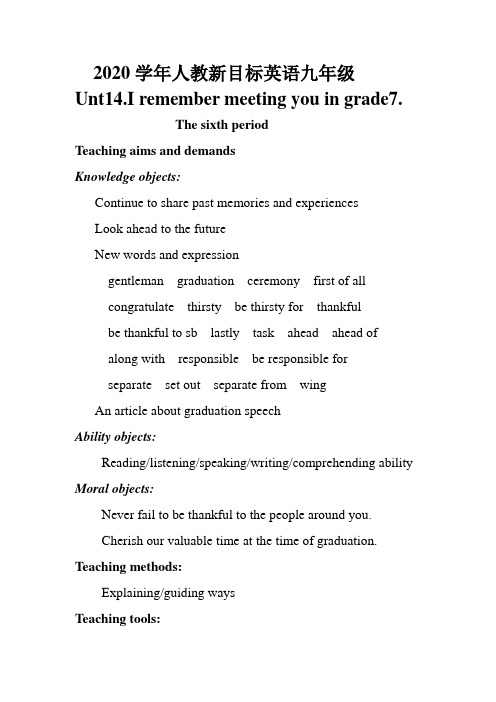
2020学年人教新目标英语九年级Unt14.I remember meeting you in grade7.The sixth periodTeaching aims and demandsKnowledge objects:Continue to share past memories and experiencesLook ahead to the futureNew words and expressiongentleman graduation ceremony first of allcongratulate thirsty be thirsty for thankfulbe thankful to sb lastly task ahead ahead ofalong with responsible be responsible forseparate set out separate from wingAn article about graduation speechAbility objects:Reading/listening/speaking/writing/comprehending ability Moral objects:Never fail to be thankful to the people around you.Cherish our valuable time at the time of graduation. Teaching methods:Explaining/guiding waysTeaching tools:The whiteboard;a tape recorder; projectorTeaching key and difficult points:Words and expressions:gentleman graduation ceremony first of allcongratulate thirsty be thirsty for thankfulbe thankful to sb lastly task ahead ahead ofalong with responsible be responsible forseparate set out separate from wingthank sb for doing sth=be thankful to sbFirst of all,would like /love to do sth,remember to do sth Remember doing sth.be full of. be thirsty for渴望. A little=kind of.Grow up. take pride in=be proud of.The beginning/end of, ahead of,make a mistake=make mistakes wait for sb,can’t wait to do sth(迫不及待做某事),along with, Make one’s own choice/decision,come back to some place,give up doing.Set out ,come out,hope to do sth.Teaching procedures:stepI.GreetingsstepII.new words and expressionsgentleman graduation ceremony first of allcongratulate thirsty be thirsty for thankfulbe thankful to sb lastly task ahead ahead ofalong with responsible be responsible forseparate set out separate from wingstepIII2a.what is the most important thing you have learned in junior high school?discuss with your partner.1.play some kinds of sports,such as,basketball....2.How to get along with classmates,build friendship.for example,study and play together,help each other......3.Have learned a lot of knowledge from books ,have dreams,and make efforts to make my dreams come true.4.Have learned to do things actively,carefully,bravely.never give up,keep moving.5.Learn how to be a human being. I want to be an active,brave, honest student,I have good manners and treat others politely.In all,to be a good student,do the right things and never give up learning and make progress every day.StepV2b.read the passage and answer the questions. Reading skills.Read it with questions three times.the first time, you read the passage quickly.you should know the common things.for example,some time,sb,sth,some place,and so on. The secondtimes you should read carefully with questions,basically finish our questions.the last time,read it again to understand completely.Question:1,what kind of text is this?Is it a story ,a speech or a notice?2.who do you think wrote it?3.Who is it for?Ladies and gentlemenThank you for coming today to attend the graduation ceremony at NO.3Junior High School.First of all,I’d like to congratulate all the students who are here today.I remember meeting you when you were just starting Grade7 at this school.You were all so full of energy and thirty for knowledge.And yes,some of you were a little difficult to deal with!But today I see a room full of talented young adults who are full of hope for the future.You are all grown up so much and I’m so proud of you.Although you’ve all worked very hard over the last three years.none of you did it alone.I hope you’ll remember the important people in your lives who helped and supported you---your parents, your teachers and your friends.Please consider what they’ve done for you and what they mean toyou.Never fail to be thankful to the people around you.Lastly,the end of junior high school is the beginning of a new life,I don’t need to tell you that life in senior high school will be harder and that you have many difficult tasks ahead of you.You’ll make mistakes along the way,but the key is to learn from your mistakes and never give up.But along with difficulties,there will also be many exiting things wait for you.Behind each door you open are chances to learn new things,and you have the abilities to make your own choices.Choose wisely and be responsible for your decisions and actions.Although you have to go your separate ways now,I hope that in a few years’time,you’ll come back to visit our school.As you set out your journey, you shouldn’t forget where you came from.The future is yours.Good luck and hope to see you again sometimes soon.(1)A speech(2)The principal/headmaster of the school is probably the person who wrote it.(3)It is for the graduating students of the school.Key points:Thank sb for doing sth=be thankful to sb attendFirst of all,would like /love to do sth,remember to do sthRemember doing sth.be full of. be thirsty for. A little=kind of. Grow up. take pride in=be proud of.The beginning/end of, ahead of,make a mistake=make mistakes wait for sb,can’t wait to do sth(迫不及待做某事),along with, Ahead of have difficulties/problems/trouble in doingHave the ability to doMake one’s own choice/decision/plan,come back to some place, give up doing. Be responsible forSet out ,come out,hope to do sth.StepVI.2c read the passage again and answer the question. Teachers ask students to read three times with 2c’squestions.1.what were the students like in Grade7?2.How have the students changed?3.Who should the students thank and why?4.What will senior high be like?5.How should the students deal with the future?6.What advice would you give to the students who are just junior high school?Answers:1.they were all so full of energy and thirsty for knowledge.2.They are now talented young adults who are full of hope for the future.3.They should thank the important people in their lives---their parents,teachers,friend----because these are the people who have helped and supported them.4.Life in senior high will be harder and they will have many difficult tasks ahead of them.5.They should learn from their mistakes and never give up.choose wisely and be responsible for their own decisions and actions,and not forget where they came from.6.Study harder,to be an honest student,to develop a good habit,have a dream,never say die,keep moving.stepVII.Fill in the blanks with the correct of the words in the box.ANSWERS:none, set out ,are thirty for, attend,be proud of. StepVIII.summay and homework.Today we finished reading a speech of graduation ceremony,and we should study really hard and get into senior high school,we should value/cherish our left time.After class,all of you should practice reading it more .homework is key points and 2d. StepX.Farewell。
人教版英语九年级下册 unit 14 第6课时 导学案
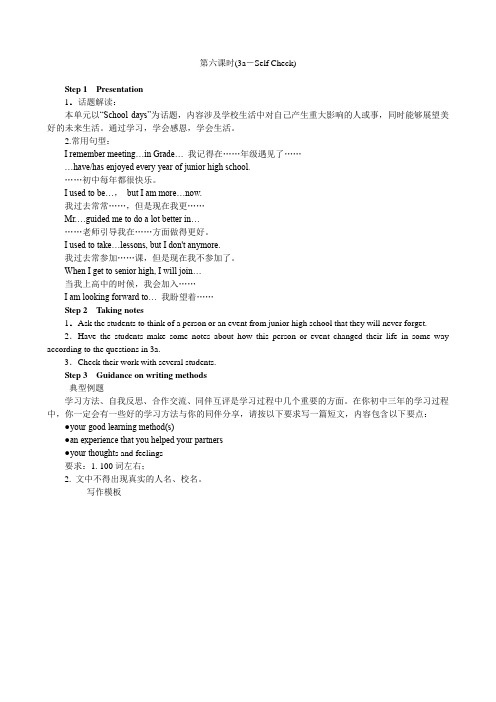
第六课时(3a-Self Check)Step 1Presentation1.话题解读:本单元以“School days”为话题,内容涉及学校生活中对自己产生重大影响的人或事,同时能够展望美好的未来生活。
通过学习,学会感恩,学会生活。
2.常用句型:I remember meeting…in Grade… 我记得在……年级遇见了………have/has enjoyed every year of junior high school.……初中每年都很快乐。
I used to be…,but I am more…now.我过去常常……,但是现在我更……Mr.…guided me to do a lot better in………老师引导我在……方面做得更好。
I used to take…lessons, but I don't anymore.我过去常参加……课,但是现在我不参加了。
When I get to senior high, I will join…当我上高中的时候,我会加入……I am looking forward to… 我盼望着……Step 2Taking notes1.Ask the students to think of a person or an event from junior high school that they will never forget.2.Have the students make some notes about how this person or event changed their life in some way according to the questions in 3a.3.Check their work with several students.Step 3Guidance on writing methods典型例题学习方法、自我反思、合作交流、同伴互评是学习过程中几个重要的方面。
2020学年人教新目标英语九年级Unit14第6课时教学设计
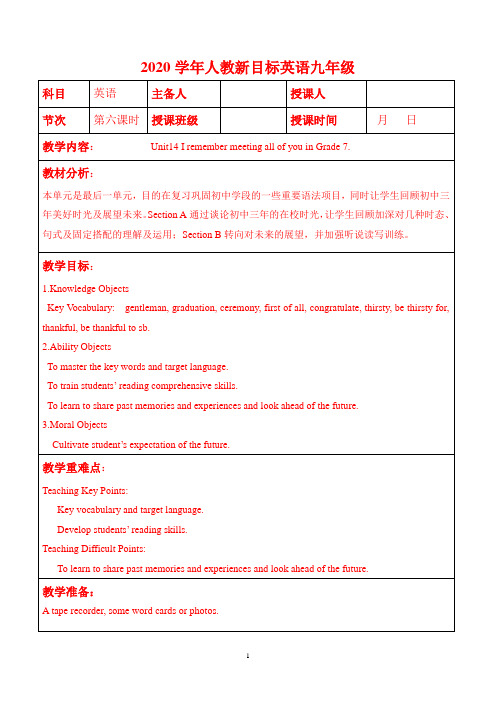
We have learned this word, graduate. It means:毕业. It is a verb. This word is a noun.
ceremony
a graduation/wedding ceremony.Can you guess the meaning? Yes,仪式,典礼
Summary
That’s all for today’s lesson. After class, pleaseread the passage over and over again. Then recite the passage.
板书设计:Unit14 I remember meeting all of you in Grade 7.
2.Ability Objects
To master the key words and target language.
To train students’reading comprehensiveskills.
To learn to share past memories and experiences and look ahead of the future.
first of all
As a student, first of all, you must study hard.
congratulate
Icongratulate you onhaving passed the exam.What do it mean?
congratulatesb.on sth./doing sth.因...向某人祝贺
教学目标:
1.Knowledge Objects
Unit 14 第6课时 SectionB 3a-Self Check教学设计)九年级英全一册人教版
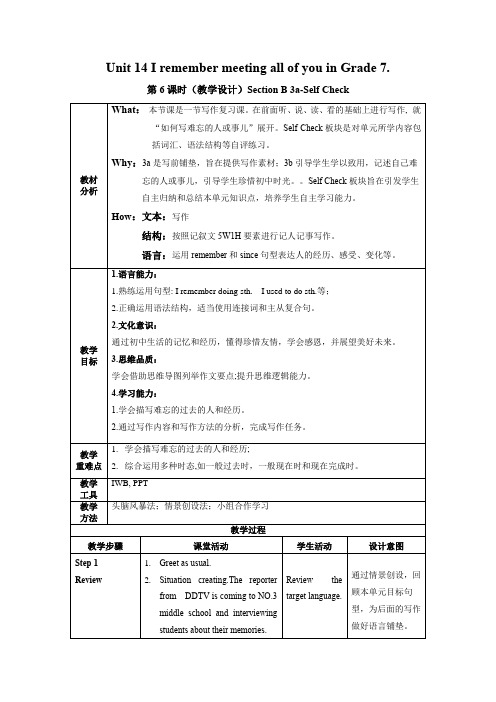
Unit 14 I remember meeting all of you in Grade 7.第6课时(教学设计)Section B 3a-Self Check●Boys and girls, your school lifewill be over. How do you feelabout your junior high schoollife?●Looking back at the past threeyears, Please think of a personor an event that you neverforget.What can you think of?效果评价观察学生是否熟练运用有关回忆的相关句型。
Step 2Pre-writing 1.Think of a person or an eventfrom junior high school that youwill never forget. Make somenotes about how this person orevent changed your life in someway.2.How to talk about a person?3.How to talk about an event?4.Lead to make an outlineWork on 3a.Work ingroups.Have adiscussion.Follow thedirectionscarefully andwrite it on yournotebook.通过讨论,引出写作主题,旨在为下面的写作提供内容上的素材准备。
通过话题分析,把握主要写作方向,分析文章结构(开始、正文、结尾、时态。
)然后列出提纲,做好进一步的写作铺垫。
5.List some useful expressions◆I remember cheering for yourbasketball game.◆I remember the excitement ofthe school sports day.◆We used to discuss the questionstogether.◆You have improved yourEnglish level since you camehere.◆.....Write sentences to describe a person or event效果评价检测学生能否根据所给topic,展开探讨,准确描述过去的人或事儿的5W1H要素。
人教版九年级英语全册第十四单元教案
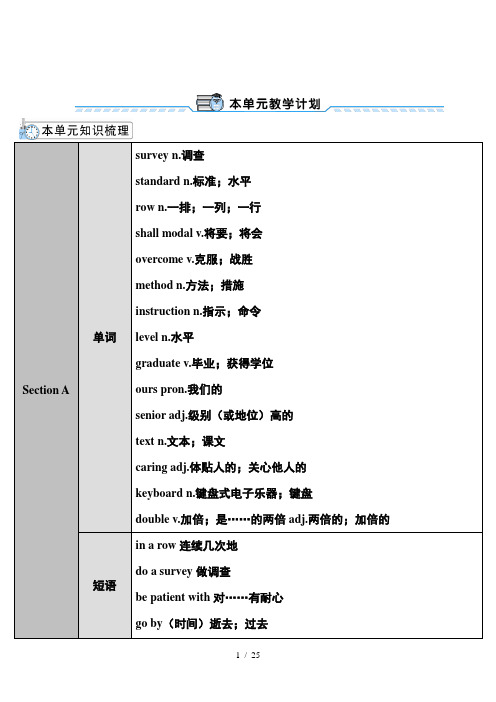
Section A 单词survey n.调查standard n.标准;水平row n.一排;一列;一行shall modal v.将要;将会overcome v.克服;战胜method n.方法;措施instruction n.指示;命令level n.水平graduate v.毕业;获得学位ours pron.我们的senior adj.级别(或地位)高的text n.文本;课文caring adj.体贴人的;关心他人的keyboard n.键盘式电子乐器;键盘double v.加倍;是……的两倍adj.两倍的;加倍的短语in a row连续几次地do a survey做调查be patient with对……有耐心go by(时间)逝去;过去graduation n.毕业ceremony n.典礼;仪式lastly adv.最后responsible adj.有责任心的短语get into被录取;被接受入学believe in信任;信赖first of all首先be thirsty for渴望;渴求deal with应对;处理be thankful to sb.对某人心存感激set out出发;启程separate from分离;隔开句型1. First of all, I’d li ke to congratulate all the students who are here today. 首先,我想祝贺今天在场的所有学生。
2. You’ve all grown up so much and I’m so proud of you.你们都成长了很多,我为你们感到无比自豪。
3. I don’t need to tell you that life in senior high school will be harder and that you have many difficult tasks ahead of you. 不需要我说你们也知道高中的生活将更加艰苦,在你们面前会有许多艰巨的任务。
最新九年级英语14单元教案
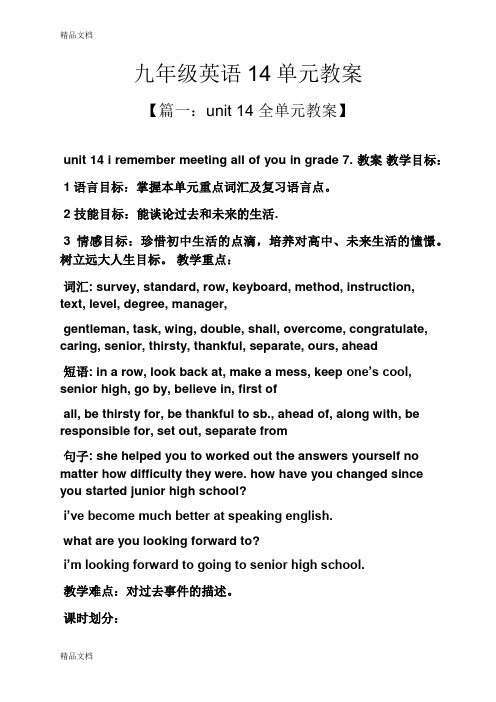
九年级英语14单元教案【篇一:unit 14 全单元教案】unit 14 i remember meeting all of you in grade 7. 教案教学目标:1语言目标:掌握本单元重点词汇及复习语言点。
2 技能目标:能谈论过去和未来的生活.3 情感目标:珍惜初中生活的点滴,培养对高中、未来生活的憧憬。
树立远大人生目标。
教学重点:词汇: survey, standard, row, keyboard, method, instruction, text, level, degree, manager,gentleman, task, wing, double, shall, overcome, congratulate, caring, senior, thirsty, thankful, separate, ours, ahead短语: in a row, look back at, make a mess, keep one’s cool, senior high, go by, believe in, first ofall, be thirsty for, be thankful to sb., ahead of, along with, be responsible for, set out, separate from句子: she helped you to worked out the answers yourself no matter how difficulty they were. how have you changed since you started junior high school?i’ve become much better at speaking english.what are you looking forward to?i’m looking forward to going to senior high school.教学难点:对过去事件的描述。
人教版九年级英语全一册 教学课件Unit 14第6课时(B 3a-Self Check)
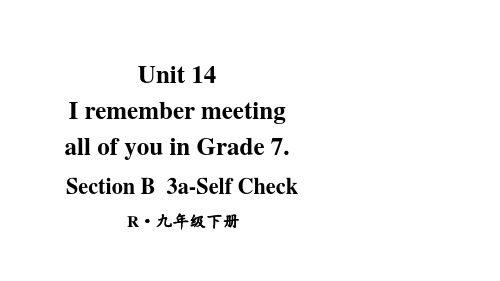
称和第二人称 3. 感谢同学,给我美好回忆,……
写作要求:1. 词数80左右,开头和结尾已给出(不计入总词数);
2. 可适当增减词汇,使语句流畅、完整;
3. 文中不能透露个人真实信息。
Good morning, everyone. I’m glad to be here to speak in front of
Mrs. Wang continued to encourage me and I became even more confident. I improved so much that I won an English speech contest that year! I will always be thankful to Mrs. Wang for her advice and support.
结尾句: Words can’t show my thanks to you! I hope you will be happy and healthy forever! 经典名句: Graduation is not the end; it’s the beginning. Wherever you go, no matter what the weather, always bring your own sunshine.
take care of 照顾 bring up 养育 look after 照看;照顾 be ready to 乐意……
give sb. advice 给某人建议 get on well with 与……友好相处 be strict with 对……严格 look ahead to 展望;为(将来)设想 look back at 回首(往事);回忆;回顾 have problems with 做……有困难
九年级英语第14单元 第6课时课件
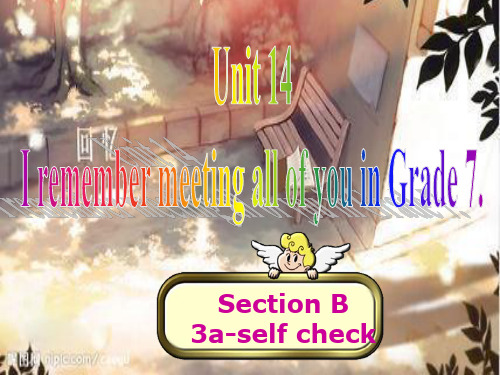
future?
1.How have you changed since you started junior high school?
ቤተ መጻሕፍቲ ባይዱ
3a
Think of that you
a person or an event will never forget.
from
junior
high
school
Make some notes about how this person or event
changed your life in some way.
Self check 2:
Fill in the blanks with the correct forms of the words in bracket
• I can’t ___b__e_li_e_v_e(believe) that today is the last day
of junior high school. I still
...
Describe the person/ event. Explain how you feel about this person/ event. Describe how this person/ event has changed your life.
When I was in junior high school, one of my classmates sit right beside me. His name is Chen Lian. He is my unforgettable person in my life. I remembered my math was just poor at that time, but he was excellent in calculating and solving mathematic questions. He often received perfect scores. Of course, I wished I could reach at his level. Since we talked all day long, I asked how he could solve those difficult questions. He was so patient and polite to answer my questions. Gradually, I built my confidence at math and finally got good grade. Now, we will be apart, but I still remember his great attitude and willing in study. I am so thankful to my classmate, who is my friend always and forever.
新人教版九年级英语 unit 14-6-优质教案.doc
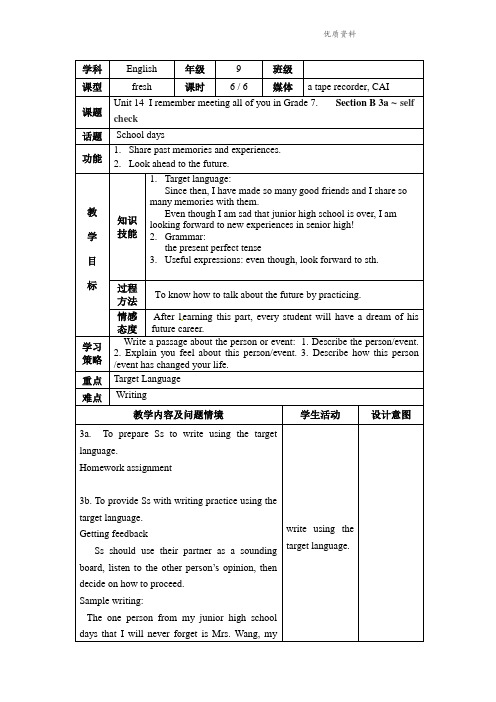
学科English 年级9 班级课型fresh 课时 6 / 6 媒体 a tape recorder, CAI课题Unit 14 I remember meeting all of you in Grade 7. Section B 3a ~ self check话题 School days功能1.Share past memories and experiences.2.Look ahead to the future.教学目标知识技能1.Target language:Since then, I have made so many good friends and I share so many memories with them.Even though I am sad that junior high school is over, I am looking forward to new experiences in senior high!2.Grammar:the present perfect tenseeful expressions: even though, look forward to sth.过程方法To know how to talk about the future by practicing.情感态度After l earning this part, every student will have a dream of hisfuture career.学习策略Write a passage about the person or event: 1. Describe the person/event.2. Explain you feel about this person/event.3. Describe how this person /event has changed your life.重点Target Language难点 Writing教学内容及问题情境学生活动设计意图3a. To prepare Ss to write using the targetlanguage.Homework assignment3b. To provide Ss with writing practice using thetarget language.Getting feedbackSs should use their partner as a sounding board, listen to the other person’s opinion, then decide on how to proceed.Sample writing:The one person from my junior high school days that I will never forget is Mrs. Wang, my write using the target language.。
- 1、下载文档前请自行甄别文档内容的完整性,平台不提供额外的编辑、内容补充、找答案等附加服务。
- 2、"仅部分预览"的文档,不可在线预览部分如存在完整性等问题,可反馈申请退款(可完整预览的文档不适用该条件!)。
- 3、如文档侵犯您的权益,请联系客服反馈,我们会尽快为您处理(人工客服工作时间:9:00-18:30)。
2) Even though I am sad that junior is over, I am looking forward to new experiences in senior high!
2. Leading-in“导入新课”
(1) Self check 1:What happened in junior high that madeyou have these feeling? Complete the chart.
4) What will senior high be like?
5) How should the students deal with the future?
Dictate some important words and expressions.
2.自由交谈
1)How have you changed since you started junior high school?
Feelings
Memories/ Experiences
excited
happy
worried
sad
tired
proud
shy
III.Practice
操练
1. Activity 3a
Think of a person or an event from junior high school that you will never forget.
九年级英语第14单元第6课时教案
Unit 14I remember meeting all of you in Grade 7.
Section B(3a—Self Check)
一、【教材分析
教
学
目
标
知识
目标
1.复习并巩固本单元出现的重点词汇和短语。
2.学习并掌握重点句型:
1) I can’t believe that today is the last day of junior high school.
教学重点
Share past memories and experiences; look ahead to the future
教学难点
运用本单元句型进行会话和写作。
教学方法
自主探究教学法;任务型教学法
二、【教学流程】
环节
师生活动
二次备课
I.Preparation
准备
1. Revision “复习检查”
2) Even though I am sad that junior is over, I am looking forward to new experiences in senior high!
能力
目标
熟练运用本单元句型进行会话和写作。
情感
目标
回忆帮助过自己的同学和老师,学会感恩。激励学生们在以后的学习中更加努力,争取更好成绩。
Describe how this person/ event has changed your life.
例文赏析:
When I was in junior high school, one of my classmates sit right beside me. His name is Chen Lian. He is my unforgettable person in my life.
3)How did you feel when you met this person?/ How did you feel when this event happened?
4)How did this person help you?/ What happened later?
5)How has this person’s advice/ event changed your life?
2)What are you plans for next year?
3)What do you hope to do in the future?
II.Presentation
呈现
1. Learning tasks“示标定向”
(1)复习并巩固本单元出现的重点词汇和短语。
(2)学习并掌握重点句型:
1) I can’t believe that today is the last day of junior high school.
2. Activity 3b
Write a passage about the person or event you thought about in 3a.
思路点拨:
Describe the person/ event.
Explain how you feel about this person/ event.
Revise the speech of page 110.
(1)Give a speech.
(2)AnsHale Waihona Puke er the questions :
1) What were the students like in Grade 7?
2) How have the students changed?
3) Who should the students thank and why?
Make some notes about how this person or event changed your life in some way.
1)Who is the person? / What is the event?
2)When and where did you first meet this person?/ When and where did this event happen?
